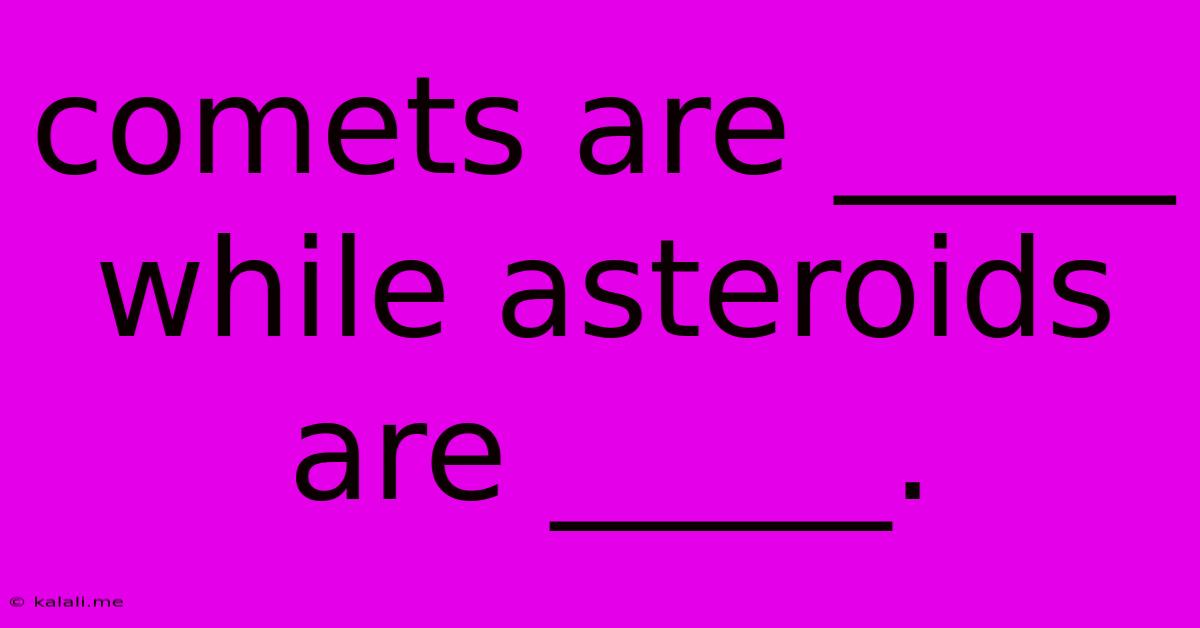Comets Are _____ While Asteroids Are _____.
Kalali
Jun 14, 2025 · 3 min read

Table of Contents
Comets are Icy Wanderers, While Asteroids are Rocky Remnants
Comets are often described as "dirty snowballs," while asteroids are more accurately characterized as "rocky remnants." This simple comparison highlights a key difference, but understanding the nuances of these celestial bodies requires a deeper dive into their composition, origin, and behavior. This article will explore the distinct characteristics of comets and asteroids, clarifying their differences and similarities.
What are Comets?
Comets are celestial objects composed primarily of ice, dust, and frozen gases. These icy bodies originate in the outer reaches of our solar system, in regions like the Kuiper Belt and the Oort Cloud, where temperatures are extremely low. As a comet approaches the sun, the solar radiation heats its surface, causing the ice to sublimate (transition directly from solid to gas). This process releases gas and dust, forming a characteristic coma – a fuzzy atmosphere surrounding the comet's nucleus. The solar wind then pushes these particles away from the sun, creating a spectacular tail that can stretch for millions of kilometers. This tail, usually composed of dust and ions, always points away from the sun.
Cometary Composition & Features:
- Nucleus: A relatively small, solid body made of ice, dust, and rocky material.
- Coma: A large, diffuse atmosphere surrounding the nucleus.
- Tail: A stream of gas and dust that extends away from the sun. Two distinct tails can often be observed – a dust tail and an ion tail.
- Highly Elliptical Orbits: Comets have highly eccentric orbits, bringing them close to the sun and then sending them far out into the outer solar system.
What are Asteroids?
Asteroids are small, rocky bodies that orbit the sun, predominantly located in the asteroid belt between Mars and Jupiter. Unlike comets, asteroids are composed mainly of rock and metal, with little or no ice. They are thought to be leftover remnants from the early solar system, material that never coalesced into planets. The size of asteroids varies significantly, from a few meters to hundreds of kilometers in diameter. Most asteroids are irregularly shaped, reflecting their chaotic formation process.
Asteroid Composition & Features:
- Rocky & Metallic Composition: Primarily composed of rock and metal, with varying proportions of silicates, nickel-iron, and other minerals.
- Irregular Shapes: Most asteroids are not spherical, exhibiting a variety of irregular shapes.
- Mostly Found in the Asteroid Belt: The majority of asteroids reside in the asteroid belt, although some have orbits that intersect with Earth's orbit, posing potential impact hazards.
- Generally Stable Orbits: Compared to comets, asteroids have relatively stable and less eccentric orbits.
Key Differences Summarized:
| Feature | Comets | Asteroids |
|---|---|---|
| Composition | Ice, dust, frozen gases | Rock, metal |
| Origin | Kuiper Belt, Oort Cloud | Asteroid belt, early solar system remnants |
| Orbit | Highly elliptical, eccentric | Relatively stable, less eccentric |
| Appearance | Coma, tail | No coma or tail |
Conclusion:
While both comets and asteroids are small bodies orbiting the sun, their compositions, origins, and behaviors differ significantly. Comets are icy wanderers from the outer solar system, exhibiting spectacular displays as they approach the sun. Asteroids, on the other hand, are rocky remnants from the early solar system, mostly residing in the asteroid belt and exhibiting less dramatic behavior. Understanding these differences is crucial to grasping the history and evolution of our solar system.
Latest Posts
Latest Posts
-
Which Of The Following Is An Example Of A Decomposer
Jun 14, 2025
-
Second Most Abundant Element On Earth
Jun 14, 2025
-
In Which Stage Of Meiosis Crossing Over Takes Place
Jun 14, 2025
-
Which Is Not A Function Of The Cytoskeleton
Jun 14, 2025
-
One Astronomical Unit Is Equal To
Jun 14, 2025
Related Post
Thank you for visiting our website which covers about Comets Are _____ While Asteroids Are _____. . We hope the information provided has been useful to you. Feel free to contact us if you have any questions or need further assistance. See you next time and don't miss to bookmark.